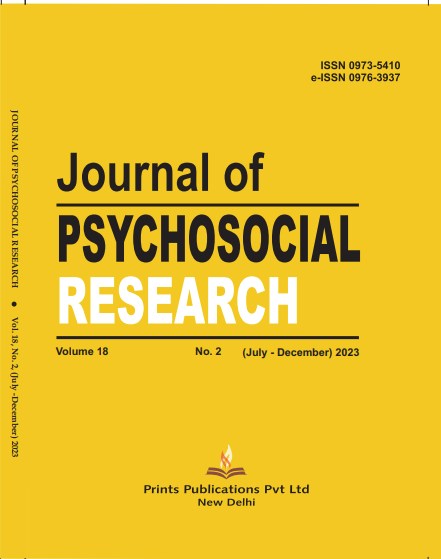Journal of Psychosocial Research
Current Volume: 20 (2025 )
ISSN: 0973-5410
e-ISSN: 0976-3937
Periodicity: Half-Yearly
Month(s) of Publication: June & December
Subject: Psychology
DOI: 10.32381/JPR
Psychoticism and Music Listening: Effects on Psychophysiological Health and Wellness
By : Vipin Kumar Singh, Uma Gupta
Page No: 55-81
Abstract:
The study was designed (1) to examine whether listening to slow-paced music played on a flute for 20 days produces any effect on the scores related to the variables of physical health, mental health, alexithymia, well-being and psychosocial capabilities in high and low scorers on the scale of psychoticism (P); (2) to adjudge whether music listening produces similar or differential effects on the scores related to the dependent variables in the two groups of participants. The high and low P scorer participants were selected on the basis of their scores on the P scale determined by administering the revised Eysenck Personality Questionnaire to 1000 postgraduate students; 80 students from the uppermost 10% students were assigned to the high P scorer group and 80 students from the lowermost 10% students were assigned to the low P scorer group. In each group the participants were randomly assigned to two subgroups, music subgroup and the control subgroup, in equal numbers. A randomly controlled psychoticism × treatments factorial design (n = 40) with pre- and post-testing on the dependent variables, was used. The study led to the following conclusions: (1) music listening significantly decreases blood pressure and heart rate, reduces stress, anxiety, depression and alexithymic tendencies (except externally oriented thinking – EOT), enhances life satisfaction, optimism and meaning in life, and improves resilience, self-efficacy and psychosocial flourishing in high P scorers; in low P scorers music listening produces similar effects but the effects were statistically significant for 11 out of 15 variables; (2) music listening produces more intensified effects in high P scorers compared to low P scorers, on all the dependent variables except alexithymia EOT. In addition, the study revealed that 26% participants in the high P scorer group (n = 80) were in the “borderline clinical depression” category and 5% in the “moderate depression” category; in the low P scorer group (n = 80) these figures were 6.25 and 1.25% respectively. Music’s potential of generating positive schemas as well as its role in producing alleviating impact on depression and negative affect and a facilitating impact on promoting wellness and positive affect were discussed.
Authors :
Vipin Kumar Singh
Ph.D. Scholar – Department of Siddhant Darshan, Institute of Medical Sciences, Banaras Hindu University, Varanasi, Uttar Pradesh.
Uma Gupta
Professor – Department of Siddhant Darshan, Institute of Medical Sciences, Banaras Hindu University, Varanasi, Uttar Pradesh.
DOI: https://doi.org/10.32381/JPR.2022.17.01.6





